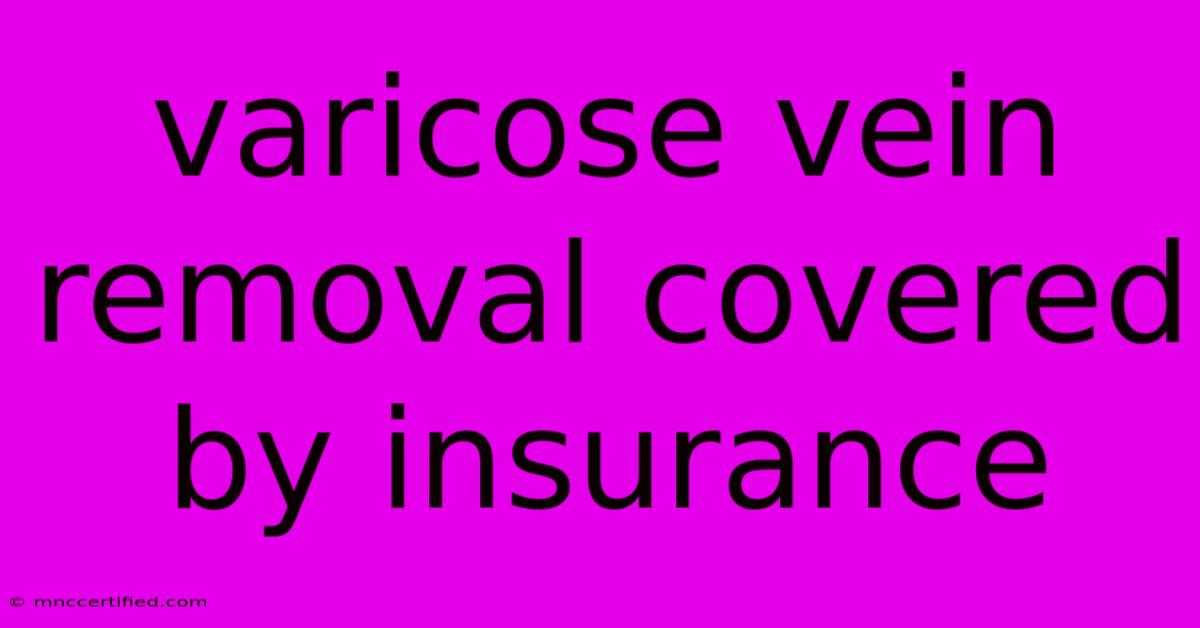Varicose Vein Removal Covered By Insurance

Table of Contents
Varicose Vein Removal: Can Insurance Cover the Cost?
Varicose veins, those unsightly, bulging veins that often appear on the legs, can be more than just a cosmetic concern. They can cause pain, fatigue, and even skin problems. If you're struggling with varicose veins, you may be wondering if your insurance will cover the cost of removal. The good news is that in many cases, insurance companies will cover at least some of the cost.
What Determines Insurance Coverage for Varicose Vein Removal?
Insurance coverage for varicose vein removal depends on a variety of factors, including:
- Your insurance plan: Different plans have different levels of coverage. Some plans may cover only medically necessary procedures, while others may cover cosmetic procedures as well.
- The reason for the procedure: Insurance companies are more likely to cover varicose vein removal if it's medically necessary, such as if you're experiencing pain, swelling, or skin problems.
- The procedure itself: Some procedures, such as sclerotherapy, are more likely to be covered than others, like laser ablation.
- Your health status: Your overall health may also play a role in coverage.
Is Varicose Vein Removal Considered Medically Necessary?
In most cases, varicose vein removal is considered medically necessary if it's done to address symptoms such as:
- Pain: Varicose veins can cause pain and discomfort, especially when standing or walking.
- Swelling: Varicose veins can also cause swelling in the legs and feet.
- Skin problems: Varicose veins can lead to skin problems, such as discoloration, ulcers, and eczema.
- Bleeding: In some cases, varicose veins can bleed, particularly after injury.
If you're experiencing any of these symptoms, your doctor can determine if your varicose veins are medically necessary to treat.
How to Determine Your Insurance Coverage
The best way to know if your insurance covers varicose vein removal is to contact your insurance provider directly. Ask the following questions:
- Does my plan cover varicose vein removal?
- What procedures are covered?
- What are the coverage limitations?
- What is my co-pay or deductible?
- Do I need a referral from my primary care physician?
By asking these questions, you'll get a clear understanding of your coverage and what to expect financially.
Alternatives to Insurance Coverage
If your insurance doesn't cover the cost of varicose vein removal, there are a few alternatives:
- Financing options: Many clinics offer financing options to help make treatment more affordable.
- Payment plans: You can discuss payment plans with your doctor or clinic.
- Healthcare savings account (HSA) or flexible spending account (FSA): You can use funds from an HSA or FSA to pay for medical expenses, including varicose vein removal.
Conclusion
While insurance coverage for varicose vein removal can vary, many plans cover at least some of the cost, especially if the procedure is medically necessary. By understanding your insurance plan, you can make informed decisions about your treatment options.
Important Note: This information is for educational purposes only and should not be considered medical advice. Consult with your doctor or other healthcare professional for personalized guidance.

Thank you for visiting our website wich cover about Varicose Vein Removal Covered By Insurance. We hope the information provided has been useful to you. Feel free to contact us if you have any questions or need further assistance. See you next time and dont miss to bookmark.
Featured Posts
-
Can You Have Insurance From Another State
Nov 07, 2024
-
Linkage Global Announces Nasdaq Notice
Nov 07, 2024
-
Metlife Accident Insurance Payout Amounts
Nov 07, 2024
-
Donald Trump Bitcoin Price Impact
Nov 07, 2024
-
Real Estate Investment Accounting Software
Nov 07, 2024